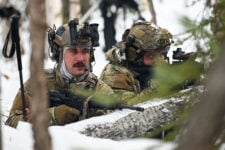 WASHINGTON: You could see the war weariness in the face of James Clapper, Director of National Intelligence, when he spoke about The Three Ss: Sequestration, Snowden, and Syria.
WASHINGTON: You could see the war weariness in the face of James Clapper, Director of National Intelligence, when he spoke about The Three Ss: Sequestration, Snowden, and Syria.
Clapper, speaking before some 450 members of the intelligence community and media, sounded close to wistful when he talked about the furious national debate about privacy and intelligence sparked by the classified documents released by the international fugitive Edward Snowden.
“I think it’s clear some of the conversation this has generated, it’s some of a conversation that should have happened — probably should have occurred — long ago….,” Clapper said at the first Intelligence and National Security Alliance (INSA) conference. “What all this has shown is we need to be more transparent about how we do our business and also more transparent about the results.”
But the head of the intelligence community also highlighted part of the reason that conversation hasn’t happened. In the meetings he’s recently had with journalists to discuss Snowden’s purloined documents, he said he’s found “a big gulf when you speak with them about just what effects national security.” He’s also “come to appreciate the huge competition in the news media,” driven in part by the 24/7 news cycle. “All those factors weigh against us.”
On the other hand, the intelligence community now is pressing hard to ensure more Snowdens don’t happen. The IC is placing “much more emphasis on insider threat detection,” Clapper said. And there’s a tool to help, called Intelligence Community Information Technology Enterprise (pronounced, wonderfully enough, Eye Sight).
“If it had been up and running, we might have detected Snowden a lot earlier than we did,” Clapper said.
But a more fundamental security problem still could trip up the IC: while initial security clearances are getting done in relatively good order, the required five-year security reviews are not keeping pace. There are “way more people are outside the scope than we should have,” Clapper conceded. “We’re going to have step up the pace on that.”
In the end, as a direct result of the documents released by Snowden and the ensuing debate, Clapper knows that many of the programs started after 911 to close the gaps between and among the intelligence agencies will be killed or curtailed.
“It’s very clear to the extent we keep these tools at all, they are going to be legislatively amended,” he said.
Meanwhile, he’s got Syria. “For me, lately, it’s been all Syria all the time,” said. And of course, there’s also sequestration.
Norway’s top officer on his ‘biggest challenge,’ next frigate and new NATO neighbors
Gen. Eirik Kristoffersen, Norway’s Chief of Defense, talks to Breaking Defense about his plans for spending on new frigates and subs, the challenges of upgrading Norway’s “digital backbone” and refilling the military’s stocks.


























